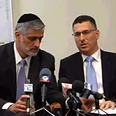

This year, in the wake of new legislation, Daylight Savings Time will stay in effect longer than usual and end on October 6, three weeks after its original ending – Yom Kippur – which falls on September 13, and two weeks later than it did last year – September 23.
Related stories:
- Daylight Savings Time to be extended by 10 days
- Israel installs Standard Time; hundreds protest
- Op-ed: Plunged into darkness
The shift stems from new legislation led by former Interior Minster Eli Yishai, who adopted a recommendation of a committee formed to examine Israel's legislation in the matter in comparison to other countries.
According to the new law, Daylight Savings Time will last 193 days, from the end of March until the beginning of October.
The committee, headed by Dov Kahat, was formed in the wake of a wave of public criticism, which peaked with a petition signed by 400,000 people calling for a revision of Israel's previous custom regarding Day Light Savings to match to one customary in the world.
The Kahat Committee found that in comparison with other nations, no evidence could be found supporting the claim that an extension of Daylight Savings until November would lead to energy savings or a reduction in number of traffic accidents.
Here comes the sun
On the other hand, organizations and MKs active on the topic claimed that the DST should be extended even further.
MK Nitzan Horowitz (Meretz) has already proposed alternative legislation calling on Israel to align with the European custom and extend the DST to 218 days, until the beginning of November.
The haredi factions, led by Shas, are expected to oppose this legislation, and it appears that the issue will fall to the hands of the new Interior Minister – Gideon Sa'ar.
Asked by Ynet about his intentions in this regard, Sa'ar said: "It is my intention to reexamine the new legislative arraignment formulated during the previous Knesset."
MK Horowoitz, on his part, said that he expected the Likud Interior Ministry to support his legislation initiative.
"The last Knesset saw a meaningful, yet partial, success," MK Horowitz said, "the Israeli public deserves an additional month of daylight, a month that would lower the number of accidents and will give people an additional hour of light during the day's most important time."
The Israel Hofshit (Be Free Israel) organization, whose mission is to promote freedom of religion and pluralism in Israel, sent Minister Sa'ar a letter requesting he reexamine the issue.
"The decision taken by the previous government has still left Israel trailing behind the rest of the developed world in regards to Daylight Savings Time and effective utilization of daylight," Miki Gitzin, the organization's general manger, said.
- Receive Ynetnews updates
directly to your desktop














